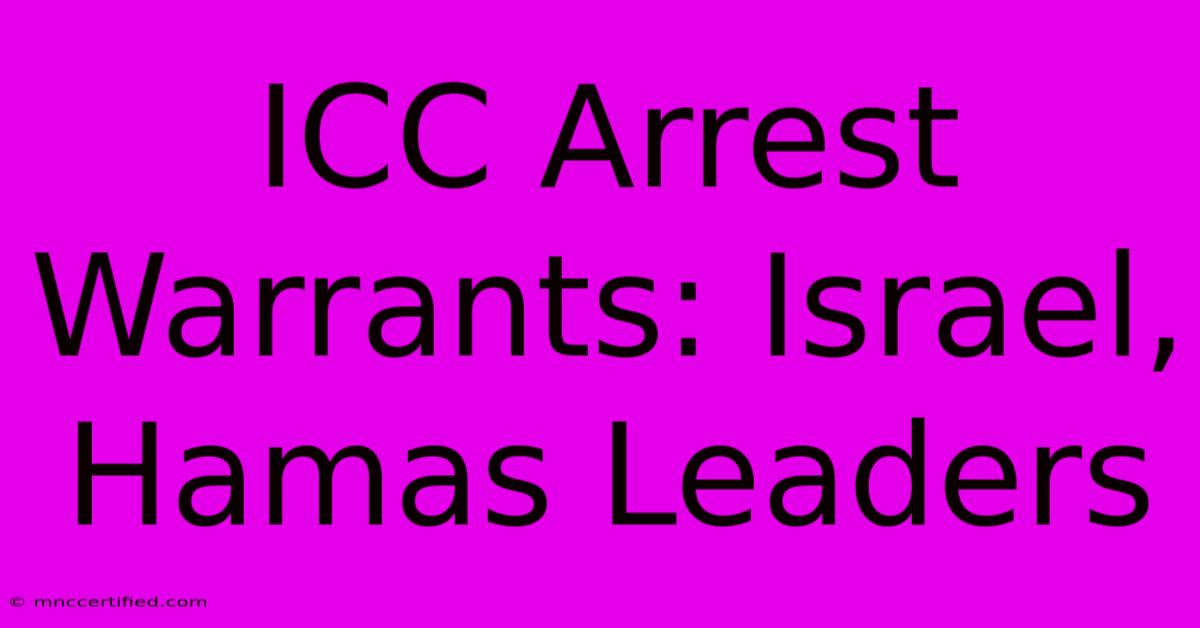ICC Arrest Warrants: Israel, Hamas Leaders

Table of Contents
ICC Arrest Warrants: Israel, Hamas Leaders – A Deep Dive into International Law and Geopolitics
The recent issuance of arrest warrants by the International Criminal Court (ICC) for both Israeli and Hamas leaders has sent shockwaves through the global community. This complex situation, fraught with geopolitical tensions and legal intricacies, demands a thorough understanding. This article will delve into the specifics of the warrants, the legal framework underpinning them, and the potential ramifications for the Israeli-Palestinian conflict.
Understanding the ICC's Jurisdiction
The International Criminal Court, established in 2002, prosecutes individuals for the most serious crimes of international concern: genocide, war crimes, crimes against humanity, and the crime of aggression. Its jurisdiction is complex, relying on several factors:
-
State Party Acceptance: The ICC's jurisdiction is primarily predicated on the acceptance of its Rome Statute by states. While both Israel and Palestine are not state parties, Palestine's declaration of acceptance in 2014 and subsequent acceptance by the ICC's Presidency has formed the basis for investigations into alleged crimes committed within the Palestinian territories. Israel, however, rejects the ICC's jurisdiction.
-
Principle of Complementarity: The ICC only acts when national courts are unwilling or unable genuinely to investigate and prosecute. This principle is crucial in understanding the ICC's role; it aims to supplement, not replace, national justice systems.
-
Geographical Limitations (and Disputes): The ICC's geographical jurisdiction is limited, focusing on events occurring within the territory of state parties or accepted declarations like Palestine's. This is where the major jurisdictional dispute lies. Israel disputes the ICC’s authority over actions within its territory and those of its citizens.
The Arrest Warrants: Specific Allegations
The ICC arrest warrants target individuals on both sides of the conflict. While the exact details remain somewhat confidential to protect ongoing investigations, the warrants generally allege serious international crimes, including:
-
War Crimes: These encompass violations of international humanitarian law during armed conflict, such as attacks targeting civilians, unlawful killings, and destruction of property. Specific accusations relating to individual actions remain under investigation and will be further revealed during the trial.
-
Crimes Against Humanity: These are widespread or systematic attacks against a civilian population. This can include murder, persecution, torture, and deportation.
-
Potential Future Charges: Depending on the ongoing investigation, further charges, potentially including genocide, may be added. The ICC investigation will continue gathering evidence and determining accountability for alleged violations.
Geopolitical Implications and International Reactions
The issuance of these arrest warrants has created significant international friction. Israel has strongly condemned the ICC's actions, deeming them biased and politically motivated. Conversely, Palestine has welcomed the warrants as a step towards accountability for alleged Israeli crimes.
The warrants have far-reaching geopolitical implications:
-
Strained Relations: The warrants further strain the already fragile relations between Israel and the international community, potentially impacting diplomatic efforts.
-
Impact on Peace Negotiations: The possibility of arrest for high-ranking officials could significantly complicate any future peace negotiations.
-
International Response: The international community's response is divided, reflecting differing perspectives on the ICC's legitimacy and the Israeli-Palestinian conflict. Many countries support the ICC's mandate while acknowledging the geopolitical sensitivities.
The Path Ahead: Challenges and Uncertainties
The legal process is likely to be protracted and challenging. Israel's refusal to cooperate with the ICC poses significant obstacles. The warrants' enforceability relies on the cooperation of states. Furthermore, the ICC's jurisdiction over individuals associated with Israeli operations remains contentious.
The situation highlights the inherent challenges in applying international law to complex geopolitical conflicts. The quest for justice and accountability intersects with powerful national interests and deeply rooted historical narratives.
Conclusion: A Complex Legal and Political Landscape
The ICC arrest warrants for Israeli and Hamas leaders represent a significant development in the Israeli-Palestinian conflict. The situation's complexity highlights the tension between international law, national sovereignty, and the pursuit of justice amidst ongoing geopolitical turmoil. The long-term consequences of these warrants remain uncertain, but their impact on the conflict and international relations is undeniable. Further analysis and updates are crucial to understanding the unfolding legal and political implications.

Thank you for visiting our website wich cover about ICC Arrest Warrants: Israel, Hamas Leaders. We hope the information provided has been useful to you. Feel free to contact us if you have any questions or need further assistance. See you next time and dont miss to bookmark.
Featured Posts
-
New Russian Missile Hits Ukraine Putin Confirms
Nov 22, 2024
-
Icc Arrest Warrants Issued
Nov 22, 2024
-
John Prescott Unique Leader Says Unison
Nov 22, 2024
-
Premier Access Insurance Company
Nov 22, 2024
-
Indian Billionaire Adani Us Fraud Case
Nov 22, 2024